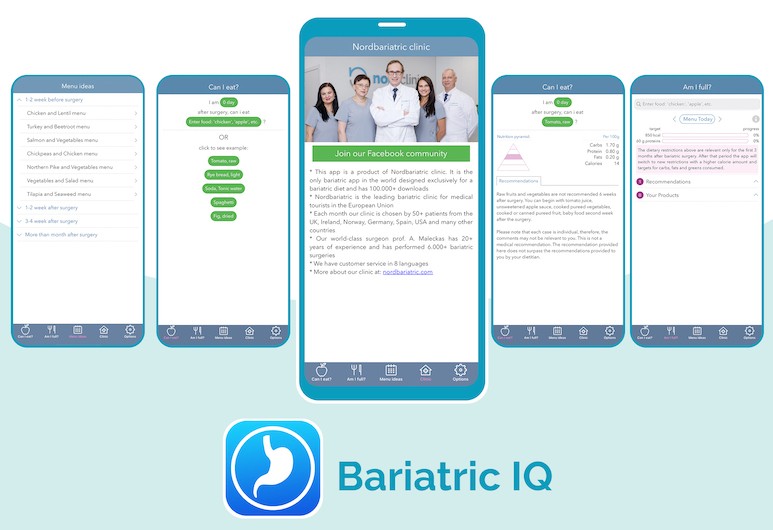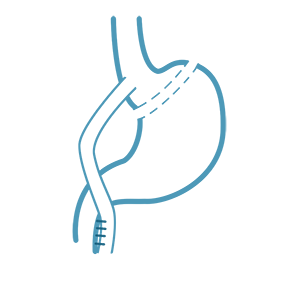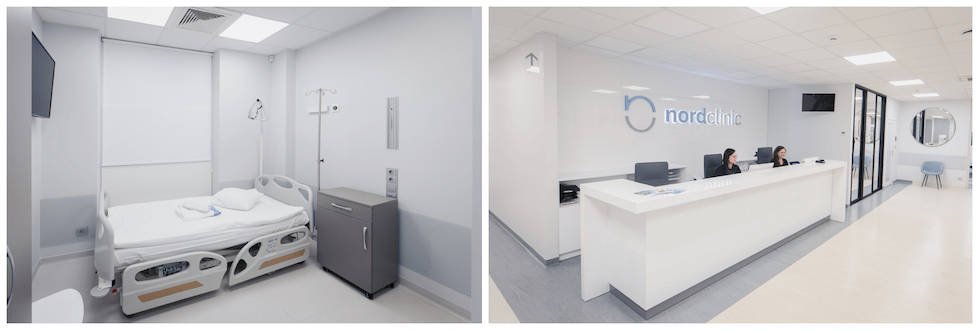Gastric Bypass Abroad: Lithuania
We are one of the leading bariatric surgery clinics for medical tourists in the European Union. We are proud of the fact that over 90 % of our patients come from the UK, Ireland, Norway, Sweden, Denmark, Germany, Switzerland and other countries.
See before-after pictures
Reviews and Facebook group
Our patients and clinic in the media
Prices
Price in GBP
Price in EUR
- Roux-en-Y gastric bypass – 5.450 £
- Mini gastric bypass – 5.450 £
- Banded gastric bypass – 6.100 £
- SASI bypass – 5.450 £
- Hiatal hernia repaired during weight loss surgery for FREE.
- Plastic surgery after a massive weight loss – from 580 £
Regular consultations with Prof. Almantas Maleckas in London
- accommodation with medical care – from 62 £ per night
- plastic surgeon consultation 12 months after surgery (if interested) – FREE
Regular price:
- consultation with the surgeon and anaesthesiologist
- all the necessary health tests before and after the surgery
- bariatric surgery
- anaesthesia
- hospital stay (1-3 days) with 24 hours medical care
- 24/7 personal assistance during your stay
- transfers to / from the airport, hotel and clinic
- diet instructions after bariatric surgery
- FREE dietician follow-up for 5 years
Get your surgery for free by claiming a refund from your local health board. We cooperate with HSE and other health boards across the EU to help our Irish and EU patients receive a refund for their weight loss surgery in Lithuania. The clinic helps with the documents needed to claim a refund after following the EU directive route for medical treatment abroad.
Please note that the price of the surgery itself is provisional and may be accurately assessed only after the evaluation of each individual case.
The default currency at our clinic is EUR, so if you were looking at prices in GBP it may vary depending on GBP / EUR exchange rate at the moment of payment.
Things to consider when choosing a clinic and surgeon abroad:
- Is it a World-class surgeon with similar experience to ours (700 bariatric surgeries per year) ?
- Is bariatric staff available? We are one of the few clinics that has a specially trained bariatric nursing staff.
- Experience with bariatric anaesthesia? Anaesthesia of overweight patients requires skill and specialised experience, and our anesthesiologists have been specialising in bariatrics for over 15 years.
- Is it a multidisciplinary private hospital? Nordbariatric is a private clinic with modern facilities and exceptional care.
- Overall knowledge in the field? We have designed a unique bariatric mobile app. Our surgeon is the co-author of more than 40 scientific articles.
All of our patients can use one of our offers available at the moment.
- Additional services in our clinic. You or your accompanying persons can explore the various services by following this link. Customise your preferences and request to book any preferred procedures.
- Brand ambassador discount. If you have a community that would be interested in our services, you can now get a discount for your procedure by spreading the word about our clinic on your social media. Contact your customer service representative for more information.
- Recommendation discount. Get a discount for your next plastic or gynaecology procedure by recommending our clinic. Contact your customer service representative for more information.
- Roux-en-Y gastric bypass – 6.150 €
- Mini gastric bypass – 6.150 €
- Banded gastric bypass – 6.800 €
- SASI bypass – 6.150 €
- Hiatal hernia repaired during weight loss surgery for FREE.
- Plastic surgery after a massive weight loss – from 2.250 €
Regular consultations with Prof. Almantas Maleckas in London
- accommodation with medical care – from 74 € per night
- plastic surgeon consultation 12 months after surgery (if interested) – FREE
Regular price:
- consultation with the surgeon and anaesthesiologist
- all the necessary health tests before and after the surgery
- bariatric surgery
- anaesthesia
- hospital stay (1-3 days) with 24 hours medical care
- 24/7 personal assistance during your stay
- transfers to / from the airport, hotel and clinic
- diet instructions after bariatric surgery
- FREE dietician follow-up for 5 years
Get your surgery for free by claiming a refund from your local health board. We cooperate with HSE and other health boards across the EU to help our Irish and EU patients receive a refund for their weight loss surgery in Lithuania. The clinic helps with the documents needed to claim a refund after following the EU directive route for medical treatment abroad.
Please note that the price of the surgery itself is provisional and may be accurately assessed only after the evaluation of each individual case.
The default currency at our clinic is EUR, so if you were looking at prices in GBP it may vary depending on GBP / EUR exchange rate at the moment of payment.
Things to consider when choosing a clinic and surgeon abroad:
- Is it a World-class surgeon with similar experience to ours (700 bariatric surgeries per year) ?
- Is bariatric staff available? We are one of the few clinics that has a specially trained bariatric nursing staff.
- Experience with bariatric anaesthesia? Anaesthesia of overweight patients requires skill and specialised experience, and our anesthesiologists have been specialising in bariatrics for over 15 years.
- Is it a multidisciplinary private hospital? Nordbariatric is a private clinic with modern facilities and exceptional care.
- Overall knowledge in the field? We have designed a unique bariatric mobile app. Our surgeon is the co-author of more than 40 scientific articles.
All of our patients can use one of our offers available at the moment.
- Additional services in our clinic. You or your accompanying persons can explore the various services by following this link. Customise your preferences and request to book any preferred procedures.
- Brand ambassador discount. If you have a community that would be interested in our services, you can now get a discount for your procedure by spreading the word about our clinic on your social media. Contact your customer service representative for more information.
- Recommendation discount. Get a discount for your next plastic or gynaecology procedure by recommending our clinic. Contact your customer service representative for more information.
Watch Peter's gastric bypass story
Only we can offer:
One of the most experienced private bariatric clinic teams in Europe. More than 7.000 bariatric surgeries were performed by our surgeon to this date. A figure that no surgeon or clinic in a region can match.
The only clinic in Europe with a specially designed bariatric mobile app for patients after weight loss surgeries. Available in 6 languages on iOS as well as Android devices.
Refund for EU patients

Get your surgery for free by claiming a refund from your local health board. The clinic helps patients with the documents needed to claim a refund after following the EU directive route for medical treatment abroad. It applies to patients who are insured under the systems of one of the EU countries and may not get the surgery due to long waiting times.
Bariatric Team

- Our surgeon Almantas Maleckas is a doctor of medical science
- UK General Medical Council (GMC) certified
- He performed over 7.000 bariatric operations
- A pioneer in laparoscopic surgery in the region
- More than 15 years working experience in Sweden, Gothenburg University hospital
- Works both in Lithuania and Sweden, speaks fluent English and Swedish
- London School of Economics graduate

- Our surgeon Nerijus Kaselis is a doctor with a degree in medicine
- Member of the International Federation of Obesity
- Has been practising abdominal surgery for over 32 years, specialising in bariatric surgery for the past 18 years
- Was the first surgeon to perform various laparoscopic surgeries in Lithuania
- Works as a team lead of surgeons in complicated obesity surgeries abroad
- Has international work and study experience

- Our surgeon Linas Venclauskas has over 15 years of experience
- Specialises in minimally invasive surgery, surgical treatment of the upper gastrointestinal tract and bariatric surgery
- Associate Professor at Lithuanian University of Health Sciences
- President of the Kaunas Society of Surgeons
- A member of the European Hernia Society
- Chairman of the Lithuanian Society of Hernia Surgery

- Our surgeon Aurika Karbonskiene has over 25 years of experience as anesthesiologist
- Over 15 years of experience as a bariatric anesthesiologist
- Since 2008 – Associate Professor at Lithuanian University of Health Sciences
- Board member of Lithuanian Society of Anesthesiologists and Intensive Care Physicians
- Member of the European Society of Anesthesiology
- Researcher and coordinator at the Clinical Trial Network of European Society of Anesthesiology

- Our surgeon Almantas Maleckas is a doctor of medical science
- UK General Medical Council (GMC) certified
- He performed over 7.000 bariatric operations
- A pioneer in laparoscopic surgery in the region
- More than 15 years working experience in Sweden, Gothenburg University hospital
- Works both in Lithuania and Sweden, speaks fluent English and Swedish
- London School of Economics graduate

- Our surgeon Nerijus Kaselis is a doctor with a degree in medicine
- Member of the International Federation of Obesity
- Has been practising abdominal surgery for over 32 years, specialising in bariatric surgery for the past 18 years
- Was the first surgeon to perform various laparoscopic surgeries in Lithuania
- Works as a team lead of surgeons in complicated obesity surgeries abroad
- Has international work and study experience

- Our surgeon Linas Venclauskas has over 15 years of experience
- Specialises in minimally invasive surgery, surgical treatment of the upper gastrointestinal tract and bariatric surgery
- Associate Professor at Lithuanian University of Health Sciences
- President of the Kaunas Society of Surgeons
- A member of the European Hernia Society
- Chairman of the Lithuanian Society of Hernia Surgery

- Our surgeon Aurika Karbonskiene has over 25 years of experience as anesthesiologist
- Over 15 years of experience as a bariatric anesthesiologist
- Since 2008 – Associate Professor at Lithuanian University of Health Sciences
- Board member of Lithuanian Society of Anesthesiologists and Intensive Care Physicians
- Member of the European Society of Anesthesiology
- Researcher and coordinator at the Clinical Trial Network of European Society of Anesthesiology
5-year follow up with dietitian
- Dietitian with a degree in the medical field.
- Diet you’ll need to follow after surgery.
- Answers to postoperative nutritional questions for 5 years after surgery.
- Read more.
11 reasons that make us the most popular bariatric clinic abroad
Our team of 3 bariatric surgeons has 15-20 years of experience in the field in total performing over 500 different bariatric surgeries per year. Moreover, our surgeons are members of various prestigious surgical societies both Lithuanian and international. Our leading bariatric surgeon Dr Almantas Maleckas has performed more than 7.000 bariatric surgeries. He is fluent in four languages, among which English and Swedish. The surgeon has been regularly working in Sweden for over 15 years. Dr Maleckas is a pioneer of laparoscopic surgery in Eastern Europe and has trained many other bariatric surgeons in the region.
We are one of the leading bariatric surgery clinics for medical tourists in the European Union. We are proud of the fact that over 90 % of our patients come from the UK, Ireland, Norway, Sweden, Denmark, Germany, Switzerland and other countries.
We are trusted by our patients and we appreciate all the reviews and feedback collected over the years. Find testimonials here or on Google.
Already more than 5.000 of our former, current and future patients joined our online community with the aim to build a space for opinions and mutual support. Members are welcome to share experiences about their visit to the clinic and to discuss all surgery-related matters.
We offer a 5-year follow-up which includes being able to get in touch with our Lithuanian dietitian Karolina. She is consulting patients after surgery and is available upon request to answer postoperative nutritional questions for five years after surgery.
Our clinic is the only clinic that has developed its own app designed specifically for bariatric patients – Bariatric IQ. The most useful feature of this app is special bariatric diet recommendations based on a particular product, a patient’s gender, time after surgery and other factors. Such a feature has not been replicated by any other bariatric apps in the world. Read more and download the app on your IOS or Android smartphone here.
Our clinic works according to the highest standards set by the European Union. This helps to guarantee the quality of medical services. We care about the safety, comfort and successful results of our patients from all over the world.
The clinic helps patients with the documents needed to claim a refund after following the EU directive route for medical treatment abroad. It applies to patients who are insured under the systems of one of the EU countries and may not get the surgery due to long waiting times.
We provide customer service in 9 foreign languages including English, Swedish, Norwegian, Danish, Italian, Spanish, French, Russian, Polish. Everyone in our clinic speaks English, including nurses, assistants and the surgeon.
Combining different plastic surgery procedures to offer optimal treatment for post-bariatric patients has been our plastic surgery department’s specialisation for many years now. We have performed such surgeries for more than 10.000 patients to this date. Since weight loss patients often require multiple surgical procedures to address excess skin, surgery planning and surgeons’ experience are very important. We carefully select patients, evaluate each case individually, and only agree to combine surgeries within health & safety limits. Our team of 9 plastic surgeons performs more than 3.000 plastic operations a year, a number that no other clinic in Central & Eastern Europe can match.
Special bariatric app for your mobile phone

- Created by Nordbariatric clinic
- Special bariatric diet recommendations based on a particular product, a patient’s gender, time after surgery and other factors
- Available in 6 languages
- Available on iOS as well as Android.
- To this date the app was downloaded more than 100.000 times!
- Read more
Direct flights to Lithuania







Our clinic

Self-catered accommodation with medical care
What is a gastric bypass?
A gastric bypass is one of the techniques used in bariatric surgery and is done not only to kick-start the weight loss process, but also to prevent or treat health problems that are associated with excess weight. Even though obesity has been prevalent for ages, only recently has it been recognised as a disease of multifactorial origin. The first attempts to treat obesity for the sole purpose of weight loss began in 1950s, when jejunoileal bypasses were done to induce a state of malabsorption (a condition when nutrient absorption is impaired). Despite reaching desired weight loss results, the procedure had too many post–operative complications to be deemed successful. The gastric bypass was developed years later, in the 1960s. The surgical technique went through numerous modifications in order to decrease the number of complications and is now one of the most frequently performed bariatric surgeries worldwide.
FAQ sessions with our surgeon
Watch full list of interview sessions on our Youtube channel.
How does a gastric bypass work?
A gastric bypass consists of two main steps:
- Firstly, the top part of the stomach is separated from the rest of the stomach, thus creating a small, 30 mlpouch.
- Afterwards, the small intestine is divided and the lower part of it is connected to the new stomach pouch.

In other words, this structure lets food bypass most of the stomach and enter into the middle part of the small intestine. Because of the small size of the stomach pouch, fewer calories are consumed, and the feeling of fullness is reached faster. Additionally, a small degree of malabsorption is caused by the food bypassing most of the stomach and a part of the small intestine. Finally, changing the route of food stream leads to a modified production of specific hormones that suppress hunger and induce the feeling of satiation. A gastric bypass is normally performed laparoscopically, i.e. via keyhole surgery, when the procedure is performed using a few small incisions rather than a large one. The choice of surgical technique varies with each individual case. The surgery itself takes up to two hours and is done under general anaesthesia.
Who is a suitable candidate for a gastric bypass?
Bariatric surgery is a suitable choice for people, who:
- have a BMI (Body Mass Index) that is 35 or above with or without conditions associated with obesity;
- have a BMI of 30 to 35 and one or more comorbidities that are caused by obesity (such as high blood pressure or type two diabetes).
It is important to mention that bariatric surgery is only recommended after the patient has unsuccessfully tried to lose weight via diet and exercise.
Severe obesity is not the only requirement for weight loss surgery: one has to be in sufficient overall health to go through the operation.
Moreover, a patient must be willing to make permanent changes to their lifestyle and take part in long–term follow–ups which involve keeping track of your health, nutrition, behaviour and medical conditions.
In addition, a psychological assessment is necessary for patients considering a gastric bypass. A patient should have realistic expectations as well – even though a gastric bypass causes considerable weight loss, permanent lifestyle changes are a crucial contribution to the results and bariatric surgery should not be seen as a magic pill for weight loss.
It is also worth noting that a gastric bypass might not be the right solution to every patient, as some health conditions might indicate for another weight loss surgery method to be recommended.
How to prepare for gastric bypass surgery? What tests are needed?
A thorough assessment is needed in order to prepare for gastric bypass surgery. Patients are evaluated by a team of professionals from different medical fields: you will need input from your nutritionist as well as a psychological assessment. You might need to get an ultrasound done for your liver evaluation. Moreover, you may need a screening for coronary artery disease depending on your age and health state.
Additionally, you will be asked to follow a low–calorie diet prior to the surgery – this will make the surgery easier and decrease the likelihood of complications.
Besides that, you will have a consultation with your surgeon. You should discuss both your expectations and any questions you may have.
Furthermore, your surgeon will ask about the medication you take, including over–the–counter drugs and vitamins or supplements. Certain drugs, such as non–steroidal anti–inflammatory medications are to be discontinued, as they increase the risk of bleeding and the formation of stomach ulcers.
You will be asked to stop smoking at least 8 weeks before the surgery and permanently afterwards.
What to expect after a gastric bypass?
You will need to stay at the clinic for 1 to 2 days after the surgery.
The surgical incisions are closed with dissolvable intra-cutaneous stitches that will not need to be removed and will dissolve over time. They will then be covered with bandages that need to be changed every few days until the wounds heal completely. Injections of anti–clotting medicine will be administered as well in order to decrease the risk of blood clots forming in the deep veins of your legs.
Additionally, you will receive painkillers for post–operative pain management.
You will not be able to consume solid foods immediately after the operation. Fluids will be administered via drip, and you may start drinking small amounts of water once you feel well enough.
Despite the necessity to stay in the clinic for a few days, you will be encouraged to get out of bed and start moving around as soon as possible.
Overall, it should take around 4 to 6 weeks to recover after gastric bypass surgery, but it is important to mention that recovery time varies with each individual case. As you lose weight, it is expected to experience certain changes for the first 3 to 6 months post bariatric surgery. The aforementioned changes can be body aches, fatigue, feeling cold, having dry skin, increased hair loss and fluctuating moods.
What supplements and vitamins will I need to take?
Because of the restricted amount of food and the bypassed intestine, there is a chance of various vitamin and mineral deficiency development. Because of that, you will need to take certain supplements on a daily basis, including:
- A high – potency multivitamin and mineral supplement that contains a minimum of 25 mg of iron, 400 mcg of folic acid, copper and zinc;
- Calcium citrate (a dose that usually varies from 1200 to 2000 mg taken in separate stages);
- 800 to 1000 international vitamin D units;
- 1 mg of vitamin B12.
Certain adjustments may be made by your surgeon or nutritionist, and later on your GP, and you should make sure to follow the instructions carefully. You should also keep in mind that you will not be able to absorb whole pills as well as you did before, and they might have difficulties passing through your digestive system during the early postoperative period. Therefore, it is recommended to crush the tablets and open the capsules or purchase your medications and supplements in liquid or chewable form for the first month after surgery.
What will my diet look like?
You will have to follow a special diet after the surgery. The consistency of your food will start with liquids and purées before you will be able move on to consuming solid foods. Because of the new structure of your digestive system, you will only be able to eat in small portions. At first, you may feel nauseous or even vomit if you eat a larger portion of food. It is normally recommended not to exceed a 1000 calories per day. Nonetheless, you should make sure to consume foods that are high in protein (you should be getting a minimum of 65 to 75 grams per day). It is also recommended to avoid added sugar and foods and beverages high in sugar (especially carbonated ones). Moreover, alcohol should be avoided altogether at least the first year after surgery. In time, you will be able to add more variety and consistency to the foods in your diet. Be sure to have regular follow–ups with your nutritionist.
What is dumping syndrome?
Dumping syndrome (also known as rapid gastric emptying) is a condition that may develop after gastric bypass surgery and occurs when food moves from your stomach into your small intestine too rapidly. The symptoms are usually present after eating and can be more intense if the meal was high in sugar. You may have dumping syndrome if you experience these symptoms 10 to 30 minutes after eating:
- Feeling bloated or too full;
- Nausea and vomiting;
- Diarrhoea;
- Abdominal cramps;
- Dizziness;
- Rapid heart rate.
Furthermore, you might experience symptoms of late dumping syndrome. Because of the low blood sugar, you may sweat, feel extremely lightheaded and weak and have a rapid heart rate.
Dumping syndrome can present itself with both early and late symptoms and can develop even after years have passed after bariatric surgery. On average, dumping syndrome can affect at least 3 out of 20 people who have had part of their stomach removed. If your symptoms cannot be controlled by dietary changes, you should contact your doctor.
Can my pouch stretch again?
Your pouch is naturally due to stretch to a certain degree over time. Nonetheless, it is highly unlikely for your pouch to go back to its original size. Even though larger meals should not cause any permanent damage, you should manage your eating habits as mentioned before: avoid overeating, don’t skip meals, be aware of the habit of emotional eating and refrain from carbonated beverages. Maintaining a steady diet will ensure that you are in the best shape possible.
How to ensure my results are successful?
It is also important to take part in the follow–up appointments with your doctor, so your progress can be tracked and any type of complications are noticed as soon as possible. In addition to everything, it is sometimes suggested to join a support group, which helps bariatric surgery patients discuss the issues they face post weight loss surgery.
Will I have loose skin after surgery? How to deal with that?
Due to excessive weight loss, you may be left with loose skin, usually on your abdomen, bottom, breasts, upper arms and thighs. Many people find this uncomfortable both psychologically and physically, as the loose skin can become irritated and painful. If you are bothered by excess skin, it is possible to fix it with cosmetic surgery. You should wait for at least a year or longer after your weight loss surgery to remove loose skin – it is important to reach a stable weight and make sure it does not change dramatically. If you are considering cosmetic surgery for loose skin, you should consult your doctor.
What are the risks?
There are complications associated with any type of surgery, such as the possibility of allergies, blood clot formation (deep vein thrombosis or pulmonary embolism), bleeding or infection. However rare, more specific gastric bypass complications include:
- Bleeding from a stomach ulcer;
- The part where your stomach is connected to the small intestine may narrow, therefore causing nausea and vomiting;
- On rare occasions, the part where your stomach is connected to the small intestine may leak (this requires immediate surgery);
- Internal hernia, which usually presents with abdominal pain;
- Bowel obstruction;
- Low blood sugar (hypoglycaemia);
- Dumping syndrome;
- Because of rapid weight loss, there is an increased risk of gallstone formation.
Common myths about gastric bypass
How much weight can I expect to lose after gastric bypass?
The degree of your weight loss depends on a variety of factors including how well you keep up with your diet and exercise and your overall commitment to lifestyle changes. On average, patients lose about 70% of their excess weight. However, you should keep in mind that the average weight loss number may not apply to you – there are people who lose more or less weight.
Send us your enquiry






